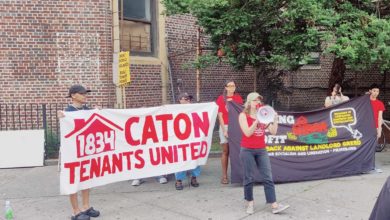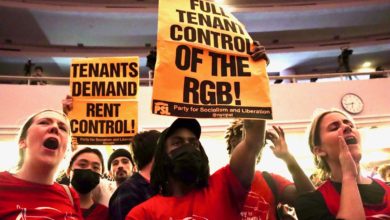Photo: Protest at the headquarters of the Alabama Association of Realtors organized by Cancel the Rents on Aug. 7
In another victory for the growing movement against evictions, a federal judge has ruled that the nationwide eviction moratorium can remain in place. This is a defeat for the Alabama Association of Realtors, a major landlords’ organization, which filed a lawsuit attempting to have the moratorium struck down.
The very same judge, Dabney Friedrich, who rejected the landlords’ request, ruled in May that the federal eviction moratorium was illegal. While she formulated a technical legal rationale based on precedent set by a higher court, it is clear that the people’s struggle was decisive in changing her mind. Friedrich is a Trump appointee and has no special fondness for working-class people facing eviction. What changed between now and May is that outrage and protest swept the country over the prospect that 11 million people could be kicked out of their homes in the middle of a pandemic. A sit-in on the steps of Congress led by Rep. Cori Bush played a central role in galvanizing this public opposition.
The legality of the eviction moratorium is likely to be taken up by an appeals court and is widely expected to be ultimately decided on by the Supreme Court. A legal opinion written by right-wing Supreme Court Justice Brett Kavanaugh in June indicated that he was inclined to side against the moratorium and held off only on the basis that it would be expiring shortly anyway. But just like Judge Friedrich, Kavanaugh and the rest of the Supreme Court can be forced by the people to change their position in short order. The fact that the new moratorium was worded more strictly as a public health measure gives judges a way out if they do not want to be seen as responsible for the eviction of millions.
But the eviction moratorium only offers temporary relief. As an immediate measure, it needs to be made indefinite for the duration of the pandemic and expanded to include all parts of the country. This can be done by act of Congress at any time, and the Democrats hold majorities in both chambers. And ultimately the crisis will not be resolved unless the government cancels the rents — wiping out all debt accumulated over the course of the pandemic by renters and mortgage holders to landlords and banks.
The clock is ticking. As the legal challenge makes its way through the courts and as the moratorium’s expiration date approaches, the mobilization of the people can be decisive. Protests, like the one organized by Cancel the Rents outside the headquarters of the Alabama Association of Realtors last weekend, have the potential to pile major pressure on those in power.






